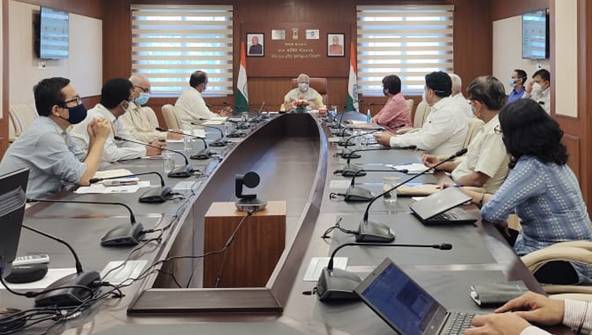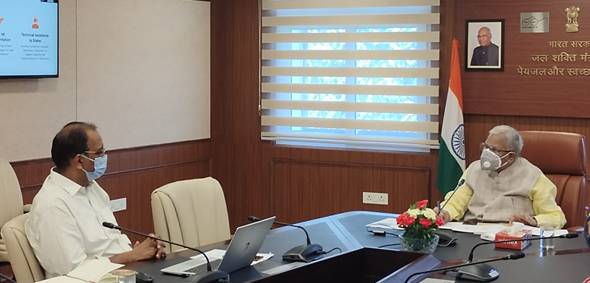The Minister of State for Jal Shakti, Shri Rattan Lal Kataria today reviewed the progress of the Swachh Bharat Mission – Grameen (SBM-G)under the Department of Drinking water and Sanitation. The Mission has been making steady progress amidst the grave challenges posed by the ongoing COVID-19 Pandemic. The department, working against time and amidst the strict regulations that were imposed owing to the pandemic, promptly released the scheme guidelines in May 2020 and compiled manuals,brochures,advisories to support capacity and implementation at State level.

The phase -2 of SBM was announced by Prime Minister Shri Narendra Modi in February, 2020 i.e. just preceding the first COVID wave in India. The phase -1 concluded in October 2019 with grand declaration of the Nation as Open Defecation Free. The Phase -2 emphasizes upon the sustainability of achievements under phase -1 and to provide adequate facilities for Solid/Liquid & plastic waste management in rural India.
Despite facing several bottlenecks, the officials have been able to motivate and encourage States to prepare and submit annual implementation plans worth Rs 40,705 Crores. The same have been approved by the NSSC- National Scheme Sanctioning Committee. It is encouraging to note that within a short span of time, 1.1 Lakh villages have reported Solid and liquid waste management (SWM/LWM) works. Around 2.41 lac villages have reported Minimal litter and stagnant waste water. 1249 villages have declared themselves as ODF plus, 53,066 community compost pits & 10.4 lacs household level SLWM assets have been constructed. Villages have also reported drainage works close to 1.60 lacs.

The MoS complemented the officials for relentlessly working closely with the state governments towards achieving targets under SBM-G, despite COVID-19 pandemic largely drawing the administrative resources towards it. Shri Kataria emphasized on the need to continuously assess the Swachhata scenario at ground level and to address emerging challenges through coordinated planning and synergized actions along with State Governments and the third tier of Government – the Gram Panchayats. Shri Kataria added that the pandemic has largely sensitized the people of this country towards personal health and hygiene. This awareness must be built upon to further the goals under Swachh Bharat Mission.
The targets for the year 2021-22 include construction of 51,05,534 IHHLs, SWM projects in 2,07,945 villages, grey water management in 1,82,517 villages, Plastic waste Management units in 2,458 blocks and 386 GOBAR-Dhan projects. The Gobardhan yojana was started in year 2018 to effectively implement the vision of Prime Minister Shri Narendra Modi to provide an economically viable and environmentally friendly solution for disposal of cow dung andorganic farm waste at village level. Swachh Bharat Mission Grameen has become a nodal monitoring agency for this project which seeks synergy amongst Ministry of New and Renewable Energy, Ministry of Petroleum & Natural Gas, Ministry of Agriculture and Ministry of Animal Husbandry, Diary and Fisheries. So far, 85 such sites have been identified for installation of biogas plant and 34 plants have been completed. The state of Chhattisgarh has taken a lead in planning such projects and soon many success stories shall be available for emulation by gram Panchayats all over India.
Shri Kataria hailed the landmark allocation, to the tune of 1.42 lac Crores over 2021-25, made by the 15th Finance commission towards Water and Sanitation sectors and termed it as a game changer for Gram Panchayats. He said that it will catapult the efforts in achieving the ODF plus status and to upgrade overall waste management ecosystem. The Department is soon going to release a MIS system to monitor all SWM related works and associated technical support material and guidelines.
******
BY/AS



